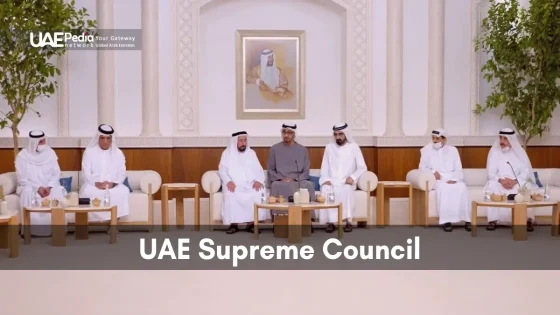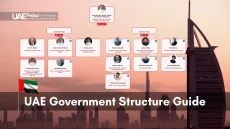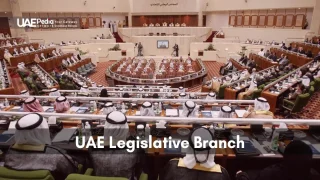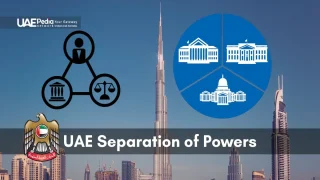UAE Government Structure: What makes the United Arab Emirates’ political system unique? This constitutional federation was set up in 1971. It has a complex structure that mixes old traditions with new ideas.
Did you know the UAE’s Constitution has 152 articles? It covers ten key areas for citizens’ rights. This detailed plan helps the country grow fast and be a big player worldwide.
UAE Government Structure
The UAE has a special way of governing. It mixes old traditions with new ideas. The country is made up of seven emirates, each ruled by a leader. The Federal Supreme Council, the top group, has these seven leaders.

Constitutional Federation Overview
The UAE Organizational follows a federal system. Its Constitution explains how power is shared. The federal government has big roles like handling foreign affairs and defense.
Seven Emirates and Their Governance
Each emirate has a lot of freedom. They have their own courts, councils, and towns. This way, they can govern well but still work together.
Federal Supreme Council Composition
The Federal Supreme Council is the UAE’s main decision-maker. It has the leaders of all seven emirates. In 2022, Sheikh Mohamed bin Zayed Al Nahyan became President. This shows how the council helps choose leaders.
Distribution of Powers Among Emirates
The UAE’s Constitution makes sure power is shared right. The federal government takes care of big issues. But, the emirates handle their own local matters. This way, everyone gets to govern well and keep their own culture.
- Federal government: Foreign affairs, defense, education
- Emirate governments: Local development, cultural affairs
Executive Leadership and Cabinet
The UAE Cabinet is at the heart of the Federal Government. It’s led by the Prime Minister. This group shapes and carries out national policies.
President and Vice Presidents
Sheikh Mohamed bin Zayed Al Nahyan leads the UAE as President. He has two Vice Presidents to help him. Together, they guide the country and speak for it worldwide.
Prime Minister’s Role and Responsibilities
Sheikh Mohammed bin Rashid Al Maktoum is both Vice-President and Prime Minister. He leads the UAE Cabinet and talks for the Federal Government. He makes sure the government works well and keeps the peace.
Current Cabinet Configuration
The UAE Cabinet has 37 ministers, with 9 women. They handle the country’s inside and outside work. They make laws and plan the budget.
Ministerial Portfolios and Functions
Ministers manage important areas like Foreign Affairs and Finance. They help the country grow by making and following policies. Each one is key to moving the country forward.
| Budget Allocation | Amount (AED) | Percentage |
|---|---|---|
| Social Development and Pensions | 27.86 billion | 39% |
| Government Affairs | 25.57 billion | 35.7% |
| Infrastructure and Economic Development | 2.58 billion | 3.6% |
| Financial Investments | 2.86 billion | 4% |
| Other Federal Expenditures | 12.62 billion | 17.7% |
Legislative and Administrative Framework
The United Arab Emirates has a special way of making laws and running things. It mixes federal power with local control. This system, based on the UAE Constitution, helps policies work well in all seven emirates.
Federal National Council Structure
The Federal National Council (FNC) is key in the UAE’s law-making. It has 40 members. Half are chosen by people, and the other half are picked by emirate rulers.
This mix of election and expert advice helps make good laws.
Constitutional Authority Distribution
The UAE Constitution has 152 articles. It divides power between the federal and emirate levels. The federal government handles big things like foreign policy and defense.
But, each emirate controls its own local matters. This balance keeps the country united and respects local freedom.
Local Government Operations
Each emirate in the UAE has a lot of freedom to govern. Some are split into municipalities with their own councils. This lets them focus on local needs.
This way, they can quickly solve local problems while still following national goals.
Policy Implementation Mechanisms
The UAE works together to make policies happen. In 2023, over 73 federal laws were passed. These laws cover important areas like money and health.
The UAE Legislation Platform was also launched. It makes it easier to find and understand federal laws. This makes governance more open and efficient in all parts of the country.


















